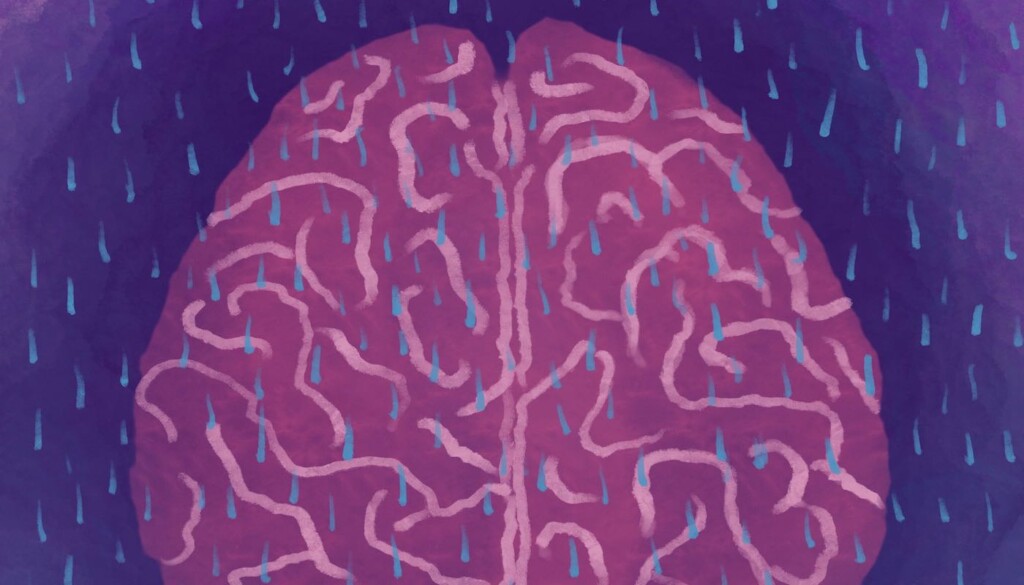 Credit: Nadia Alzoubi and Natalie Hauglund
Credit: Nadia Alzoubi and Natalie HauglundA good night’s sleep clears your mind, suggests new research, like turning on a dishwasher before you go to bed and waking up with a clean brain.
The international team of scientists describes the process as washing away waste that builds up in the brain during waking hours.
Their findings also offer insights into how sleeping pills may disrupt the “brainwashing” system, potentially affecting cognitive function in the long term.
Researchers already know that the brain has a built-in waste removal process called the ‘glymphatic system,’ which circulates fluid in the brain and spinal cord to clear it out.
The process helps remove toxic proteins that form sticky plaques linked to neurological disorders, such as Alzheimer’s disease—but what drives the system had remained unclear, until now.
Danish scientists from the University of Copenhagen found that a molecule called norepinephrine plays a key role in brain cleaning in mice.
During deep sleep, the brainstem releases tiny waves of norepinephrine about once every 50 seconds.
The study’s senior author, Professor Maiken Nedergaard of the University of Rochester in New York, explained that norepinephrine triggers blood vessels to contract, generating slow pulsations that create a rhythmic flow in the surrounding fluid to carry waste away.
She said, “It’s like turning on the dishwasher before you go to bed and waking up with a clean brain.
“We’re essentially asking what drives this process and trying to define restorative sleep based on glymphatic clearance.”
To find clues, she and her team looked into what happens in mice when the brain sleeps. They focused on the relationship between norepinephrine and blood flow during periods of deep sleep.
They found that norepinephrine waves correlate to variations in brain blood volume, suggesting norepinephrine triggers a rhythmic pulsation in the blood vessels.
The researchers then compared the changes in blood volume to brain fluid flow, finding that the brain fluid flow fluctuations correspond to blood volume changes. The vessels act as pumps to propel the surrounding brain fluid to flush out waste.
“You can view norepinephrine as this conductor of an orchestra,” explained study lead author Dr. Natalie Hauglund, of the University of Copenhagen and the University of Oxford.
“There’s a harmony in the constriction and dilation of the arteries, which then drives the cerebro-spinal fluid through the brain to remove the waste products.”
Dr. Hauglund then wanted to know if all sleep was created equal.
To find out, the research team gave zolpidem, a common drug to aid sleep, to mice.
They found that the norepinephrine waves during deep sleep were 50% lower in zolpidem-treated mice than in naturally sleeping mice. Although the zolpidem-treated mice fell asleep faster, fluid transport into the brain dropped more than 30%.
SMART SLEEP: Brain Matter May Remain Higher In People Who Love Taking a Nap
The researchers say their findings published in the journal Cell show that the sleeping pills likely disrupt the norepinephrine-driven waste clearance during sleep—and the findings probably apply to humans, as well, because also have a glymphatic system.
Scientists have observed similar norepinephrine waves, blood flow patterns, and brain fluid flux in humans.
“More and more people are using sleep medication, and it’s really important to know if that’s healthy sleep,” said Hauglund in a media release. “If people aren’t getting the full benefits of sleep, they should be aware of that, so they can make informed decisions.”
Their findings may also offer insights into how poor sleep may contribute to neurological disorders such as Alzheimer’s.
“Now we know norepinephrine is driving the cleaning of the brain, we may figure out how to get people a long and restorative sleep,” concluded Prof. Nedergaard.
SLEEP-AID ALERT: Share the Latest Data With Friends On Social Media…
Source link

